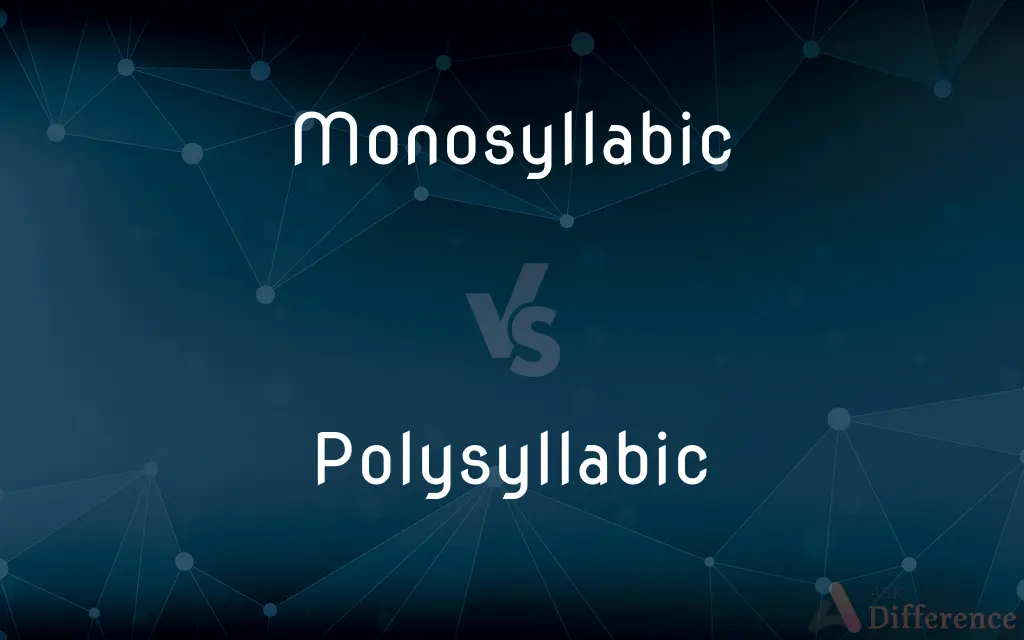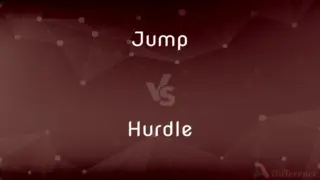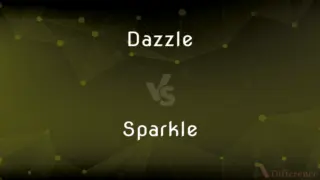Monosyllabic vs. Polysyllabic — What's the Difference?
By Tayyaba Rehman & Urooj Arif — Updated on March 26, 2024
Monosyllabic words consist of a single syllable, while polysyllabic words have multiple syllables, highlighting the complexity in pronunciation and rhythm.

Difference Between Monosyllabic and Polysyllabic
Table of Contents
ADVERTISEMENT
Key Differences
Monosyllabic words are characterized by their simplicity and brevity, often forming the core of basic vocabulary in English. They are single-syllable words like "cat" or "dream," which provide a straightforward and impactful means of communication. On the other hand, polysyllabic words contain two or more syllables, such as "beautiful" or "understanding." These words often convey more complex ideas or nuances and can add rhythm and flow to language due to their varied syllable structure.
Monosyllabic words are typically easier for learners to pronounce and remember due to their simplicity. They can serve as building blocks for language acquisition, especially in early learning stages. Conversely, polysyllabic words, with their multiple syllables, present more challenges in pronunciation and memorization but are crucial for expressing more complex concepts and enriching one's vocabulary.
In terms of usage, monosyllabic words can lend a sense of clarity and forcefulness to communication, making statements appear more decisive. Polysyllabic words, however, can soften or complicate statements, allowing for more detailed expressions and subtler nuances in meaning.
Monosyllabic words often play a significant role in poetry and music, where rhythm and meter are crucial. Their single-syllable structure can contribute to a more staccato or forceful rhythm. Polysyllabic words, with their varied syllabic lengths, can introduce a more fluid or complex rhythmic pattern, enriching the auditory experience of poems and songs.
The use of monosyllabic and polysyllabic words can significantly affect the readability and tone of written texts. Monosyllabic words can make texts more accessible and easier to read, whereas polysyllabic words can increase the complexity and sophistication of the language used, potentially targeting a more advanced audience.
ADVERTISEMENT
Comparison Chart
Number of Syllables
1
2 or more
Pronunciation
Generally simpler
More complex
Example Words
"Dog," "light," "tree"
"Understanding," "beautiful," "electric"
Usage in Language
Basic vocabulary, forceful statements
Complex concepts, nuanced expressions
Impact on Readability
Increases readability
May decrease readability for beginners
Compare with Definitions
Monosyllabic
Involving only one syllable.
The word sun is monosyllabic and easy to pronounce.
Polysyllabic
Comprising two or more syllables.
The term revolutionary is polysyllabic and rich in meaning.
Monosyllabic
Conveying meaning straightforwardly without complexity.
No is a monosyllabic response but very clear.
Polysyllabic
Capable of conveying subtle differences in meaning.
Magnificent is a polysyllabic adjective that adds depth to descriptions.
Monosyllabic
Characterized by shortness or conciseness.
The command Stop is monosyllabic and immediate.
Polysyllabic
Having a flow due to the variation in syllable count.
Unbelievable adds a rhythmic quality to speech.
Monosyllabic
Fundamental in nature, often used in early language learning.
I is a monosyllabic word used frequently in English.
Polysyllabic
Reflecting a high degree of complexity or refinement.
Philosophical is a polysyllabic word indicating advanced thinking.
Monosyllabic
Having a strong effect despite simplicity.
The word Go is monosyllabic but can initiate significant action.
Polysyllabic
Often used in academic or formal contexts.
Interdisciplinary is a polysyllabic term common in educational settings.
Monosyllabic
Having only one syllable.
Polysyllabic
Having more than two and usually more than three syllables.
Monosyllabic
Characterized by or consisting of monosyllables.
Polysyllabic
Characterized by words having more than three syllables.
Monosyllabic
Consisting of one syllable.
Polysyllabic
(of a word) Having more than one syllable; having multiple or many syllables.
"Antidisestablishmentarianism" definitely qualifies as a polysyllabic word.
‘Polysyllabic’ is a polysyllabic word.
Monosyllabic
Using monosyllables, speaking in monosyllables; curt.
Polysyllabic
(of spoken or written language) Characterized by or consisting of words having numerous syllables.
I have a particularly off-putting predilection for the utilization of ponderously polysyllabic linguistic constructions.
Monosyllabic
A word consisting of one syllable
Polysyllabic
A word having more than one syllable
Monosyllabic
Being a monosyllable, or composed of monosyllables; as, a monosyllabic word; a monosyllabic language.
Polysyllabic
Pertaining to a polysyllable; containing, or characterized by, polysyllables; consisting of more than three syllables.
Monosyllabic
Having or characterized by or consisting of one syllable
Polysyllabic
Having or characterized by words of more than three syllables
Polysyllabic
(of words) long and ponderous; having many syllables;
Sesquipedalian technical terms
Common Curiosities
What are polysyllabic words used for?
For expressing more complex concepts and adding rhythm to language.
Can monosyllabic words be complex in meaning?
Yes, despite their simplicity, they can convey complex ideas.
Are polysyllabic words harder to learn?
They can be, due to their complexity in pronunciation and memorization.
Can a text have both monosyllabic and polysyllabic words?
Yes, a mix of both types enriches language and expression.
Can learning polysyllabic words improve vocabulary?
Yes, it significantly enriches one's vocabulary.
Are all basic words monosyllabic?
Many are, but not all basic concepts are expressed with single syllables.
Why are monosyllabic words important in poetry?
They can add a rhythmic or forceful quality to the poem.
Is "child" a monosyllabic or polysyllabic word?
Monosyllabic, as it has only one syllable.
What is a monosyllabic word?
A word consisting of only one syllable.
How do monosyllabic words affect readability?
They make texts easier to read and understand.
Do polysyllabic words make language more interesting?
Yes, by introducing variety in rhythm and nuance.
Do polysyllabic words slow down speech?
They can, depending on how they're used in sentences.
What makes a word polysyllabic?
Having two or more syllables.
Why might an author choose polysyllabic words over monosyllabic ones?
To add complexity, nuance, and flow to their writing.
How do monosyllabic words contribute to clarity in communication?
Their simplicity and brevity make messages clear and direct.
Share Your Discovery

Previous Comparison
Jump vs. Hurdle
Next Comparison
Dazzle vs. SparkleAuthor Spotlight
Written by
Tayyaba RehmanTayyaba Rehman is a distinguished writer, currently serving as a primary contributor to askdifference.com. As a researcher in semantics and etymology, Tayyaba's passion for the complexity of languages and their distinctions has found a perfect home on the platform. Tayyaba delves into the intricacies of language, distinguishing between commonly confused words and phrases, thereby providing clarity for readers worldwide.
Co-written by
Urooj ArifUrooj is a skilled content writer at Ask Difference, known for her exceptional ability to simplify complex topics into engaging and informative content. With a passion for research and a flair for clear, concise writing, she consistently delivers articles that resonate with our diverse audience.














































